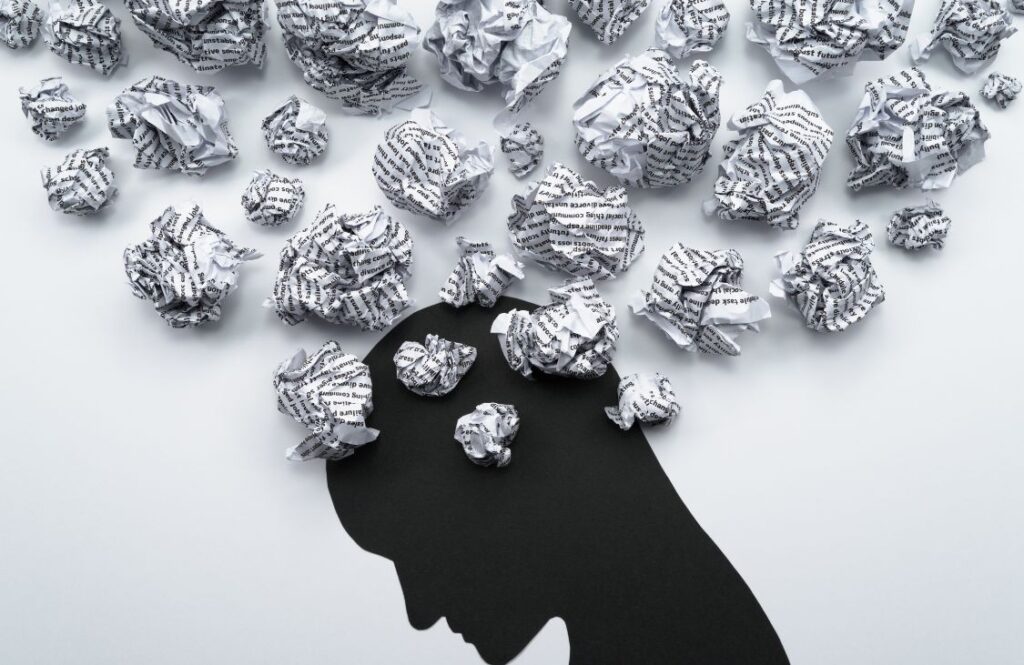Major depression is one of the most prevalent mental health disorders, impacting over 21 million American adults—more than 8% of the population—every year. While some individuals benefit from traditional treatments like medication and psychotherapy, many others find little to no relief.
Fortunately, Transcranial Magnetic Stimulation (TMS) for depression offers an alternative solution. By using magnetic fields to stimulate nerve cells in the brain, TMS for depression provides hope for individuals who continue to battle persistent symptoms.
Here are the five signs that someone should seek TMS for depression treatment in Danbury, CT.
Table of Contents
Table of Contents
Key Takeaways
What is TMS for Depression?
5 Signs to Seek TMS for Depression Treatment
1. Persistent Negative Emotional and Behavioral Patterns
2. Difficulty Maintaining Interpersonal Relationships
3. Withdrawing or Isolating from Others
4. Feeling Hopeless About the Future
5. Experiencing Depression with Anxious Features
What to Expect from TMS for Depression Treatment
Why TMS for Depression Could Be the Right Choice
Frequently Asked Questions
Discover TMS at Contemporary Care Center in Danbury, CT!
| Key Takeaways ✔ TMS for depression is a non-invasive, FDA-approved treatment that stimulates mood-regulating brain regions using magnetic pulses. ✔ TMS for depression is effective for those with treatment-resistant depression who haven’t found success with medication or therapy. ✔ Key signs someone should consider TMS for depression include persistent negative emotions, difficulty maintaining relationships, and social withdrawal. ✔ TMS for depression can help re-engage individuals socially by alleviating symptoms that lead to isolation. ✔ Individuals feeling hopeless about the future may benefit from TMS for depression as it lifts emotional burdens and restores optimism. ✔ TMS for depression effectively treats both depression and anxiety by targeting specific brain circuits related to mood and anxiety. ✔ The treatment involves short, regular sessions with minimal side effects, such as mild headaches or scalp discomfort. ✔ TMS for depression provides long-term relief without cognitive impairment and serves as a safe, non-invasive alternative to medication. |
What is TMS for Depression?
TMS for depression is an FDA-approved treatment designed for individuals with treatment-resistant depression. During the procedure, a magnetic coil is placed near the scalp to deliver repetitive pulses to specific brain regions involved in mood regulation, such as the prefrontal cortex.
This non-invasive method stimulates nerve cells that are often underactive in people with depression. Unlike medications, which can take weeks to produce noticeable effects, TMS for depression often shows results after just a few weeks of treatment.
5 Signs to Seek TMS for Depression Treatment
Depression can manifest in different ways, and for some, it becomes so entrenched in their daily life that they may not realize when conventional treatments stop working. Recognizing specific signs that traditional therapies aren’t helping is crucial to exploring new treatment options like TMS for depression.
The following five signs suggest that TMS for depression may be a viable option for individuals who have not found success with medication or therapy.
1. Persistent Negative Emotional and Behavioral Patterns
A major red sign that someone should consider TMS for depression is the persistence of negative emotional and behavioral patterns, even after undergoing standard treatments. This emotional state often leads to negative behaviors, such as neglecting daily responsibilities, engaging in self-destructive actions, or isolating oneself from loved ones.
In cases where medication and therapy fail to address these issues, TMS for depression could offer a solution. By stimulating underactive regions of the brain associated with mood, TMS for depression helps rewire neural pathways. The ability to shift from negative thought patterns to more balanced emotional states can drastically improve a person’s overall well-being.
Examples of persistent patterns include:
- Chronic Sadness: Feeling down or melancholic most of the day.
- Frequent Irritability: Short temper and constant frustration.
- Risk-Taking Behavior: Engaging in harmful activities such as substance abuse or reckless decisions.
2. Difficulty Maintaining Interpersonal Relationships
Depression not only affects the individual but also has far-reaching consequences on relationships. When someone is struggling with depression, they may find it challenging to maintain healthy interpersonal relationships. The symptoms that often accompany depression can lead to misunderstandings, frustration, and even the dissolution of relationships.
People who find themselves in constant conflict with loved ones or who avoid social interactions altogether might benefit from TMS for depression. This treatment helps stabilize mood, making it easier for individuals to communicate effectively and engage in meaningful relationships.
Key signs of relationship difficulties include:
- Emotional Withdrawal: Avoiding emotional intimacy or meaningful conversations.
- Increased Irritability: Snapping at loved ones without reason.
- Social Avoidance: Declining social invitations or finding it difficult to maintain friendships.

3. Withdrawing or Isolating from Others
One of the most common coping mechanisms for depression is social withdrawal. Individuals experiencing depression may begin to isolate themselves from friends, family, and social gatherings, believing that they are a burden or that no one understands their struggles. Unfortunately, isolation often exacerbates the condition, leading to a deeper sense of loneliness and helplessness.
TMS for depression can help individuals reengage with the world around them by alleviating the symptoms that lead to withdrawal. As TMS for depression begins to take effect, patients often experience a boost in energy, motivation, and interest in social activities. This reengagement with others can significantly enhance a person’s support network, which impacts mental health recovery.
Signs of social withdrawal include:
- Avoiding Phone Calls and Messages: Not responding to loved ones for extended periods.
- Skipping Events: Turning down invitations to family gatherings, parties, or even casual outings.
- Cutting Ties with Close Friends: Drifting away from friendships due to depression.
4. Feeling Hopeless About the Future
A common symptom of severe depression is a pervasive sense of hopelessness. This often presents as a belief that things will never improve, that there’s no point in trying, and that the future holds no promise. This mindset can prevent individuals from pursuing goals, engaging in hobbies, or even completing basic daily tasks.
When someone feels trapped in this hopeless state, it may be time to consider TMS for depression. By stimulating the brain’s mood-regulating centers, TMS for depression can help lift the emotional weight that keeps individuals stuck in this negative mindset. Over time, patients often begin to regain their sense of hope and optimism.
Symptoms of hopelessness include:
- Lack of Motivation: Feeling too overwhelmed to start new projects or pursue hobbies.
- Neglecting Daily Activities: Not engaging in self-care, household chores, or work responsibilities.
- Pessimistic Outlook: Believing that nothing will improve, regardless of any efforts made.
5. Experiencing Depression with Anxious Features
In many cases, depression and anxiety coexist, known as anxious depression. Anxiety disorders are the most common mental health conditions in the U.S., affecting more than 40 million adults, or 19.1% of the population. This can be particularly difficult to treat with medications, as some antidepressants may even exacerbate anxiety symptoms.
TMS for depression has shown promise in treating both depression and its anxious features. By targeting the brain’s mood and anxiety circuits, TMS for depression helps alleviate both sets of symptoms.
Common features of anxious depression include:
- Restlessness: Feeling unable to relax, even in calm situations.
- Racing Thoughts: Constant worry or negative thoughts that are hard to control.
- Physical Symptoms: Tension, racing heart, or trouble sleeping.

What to Expect from TMS for Depression Treatment
For individuals considering TMS for depression, it’s important to understand what the treatment involves. The process is simple, non-invasive, and designed to fit into a patient’s daily life without causing major disruptions. Here’s what to expect:
Session Duration and Frequency
- A typical TMS for depression session lasts 30 to 40 minutes.
- Patients usually undergo five sessions per week for four to six weeks.
- Consistent treatment is necessary to achieve long-lasting results.
During the Session
- A magnetic coil is placed near the patient’s scalp.
- The coil delivers repetitive magnetic pulses to stimulate the prefrontal cortex, a region of the brain involved in mood regulation.
- Patients may feel a tapping sensation or mild discomfort but can relax, read, or listen to music during the session.
Preparation Before the Session
- No major preparation is required, and patients can eat, drink, and take medications as usual.
- It’s recommended to wear comfortable clothing and remove any metal jewelry or accessories to avoid interference with the magnetic field.
Side Effects
- The most common side effects include mild headaches, scalp discomfort, or tingling sensations near the treatment site.
- These side effects are generally mild and subside after a few sessions.
- Over-the-counter pain relievers like ibuprofen can help ease any discomfort.
Recovery
- Unlike other depression treatments, TMS for depression does not require anesthesia or downtime.
- Patients can drive themselves to and from sessions and resume their normal activities immediately after.
Progress and Results
- Some patients notice improvements in mood and energy within the first few weeks, while others may need the full treatment course to see significant changes.
- Completing the entire treatment regimen is crucial to maximizing the effectiveness of TMS for depression.
- Maintenance sessions may be necessary in the future to sustain the results.
Post-Treatment Follow-Up
- After completing the treatment course, patients usually have follow-up appointments to monitor their progress.
- Some individuals may continue with talk therapy, medications, or lifestyle changes alongside TMS for depression for long-term mental health maintenance.
Why TMS for Depression Could Be the Right Choice
For individuals who have exhausted other treatment options, TMS for depression provides a non-invasive, scientifically proven method to alleviate depression symptoms. It offers a range of benefits, including:
- Non-Invasive Treatment: No surgery or recovery time is needed, and patients can go about their normal activities immediately after each session.
- Minimal Side Effects: TMS for depression comes with far fewer side effects compared to antidepressants, which can cause weight gain, fatigue, or sexual dysfunction.
- Targeted Therapy: TMS for depression focuses on specific areas of the brain responsible for mood regulation, unlike medications that affect the entire body.
- Long-Term Relief: Many patients experience lasting symptom relief, sometimes with minimal need for follow-up treatments.
- Safe for Medication-Resistant Depression: TMS for depression is particularly effective for individuals who have not responded well to traditional treatments like medications or talk therapy.
- No Cognitive Impairment: Unlike electroconvulsive therapy (ECT), which can cause memory loss or confusion, TMS for depression does not impair cognitive function.
- Non-Invasive Alternative to Medication: For patients who are unable to tolerate the side effects of antidepressants or are looking to reduce their reliance on medication, TMS for depression provides a drug-free alternative that directly targets brain function.

Frequently Asked Questions
How long does it take for TMS to work for depression?
Results from TMS for depression can often be seen within 2-4 weeks of starting treatment. However, some individuals may need to complete the full course, typically lasting 4-6 weeks, to experience significant improvement. Patience is key, as the brain’s response to TMS varies from person to person.
Is TMS for depression covered by insurance?
Many insurance providers do cover TMS for depression, especially for those diagnosed with treatment-resistant depression. Coverage, however, varies based on the specific insurance plan and provider. It’s best to check with the insurance company to confirm eligibility and any potential out-of-pocket costs.
How effective is TMS for treating depression?
TMS for depression has shown a success rate of around 50-60% in reducing symptoms for individuals with treatment-resistant depression. Approximately one-third of patients achieve full remission of their symptoms. The effectiveness of TMS can vary, but many find it to be a valuable option when other treatments have failed.
Can you combine TMS with antidepressants?
Yes, TMS for depression can be safely combined with antidepressants. This approach is often used when medications provide partial relief, with TMS enhancing the overall treatment outcome. It’s important to work with a healthcare provider to tailor the treatment plan to the individual’s needs.
Is TMS for depression a permanent solution?
TMS can offer long-lasting relief, but some patients may require maintenance sessions to sustain the positive effects. The need for follow-up treatments depends on the individual and the severity of their depression. While TMS provides significant benefits, it’s not always a one-time, permanent solution.

Discover TMS at Contemporary Care Center in Danbury, CT!
If you or a loved one are struggling with depression and haven’t found success with traditional treatments, it may be time to explore TMS for depression. At Contemporary Care Center, we offer this innovative, non-invasive treatment to help you find relief and regain control of your life. Residents of Danbury, CT, can trust the expert team at Contemporary Care Center to provide personalized care tailored to your unique needs.
Don’t wait any longer—take the first step towards lasting relief from depression by scheduling a consultation with Contemporary Care Center today!




